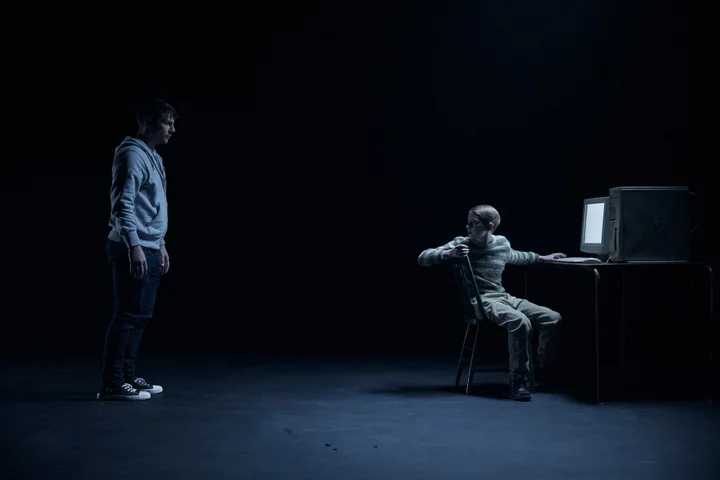I still remember the terror that skipped down my spine in the summer of 2017 as I scrolled through the notorious "Dear David" thread. I was on a New York subway, sweating because broken air conditioning on those trains was their most reliable attribute. And yet I had chills — literal chills.
The ghost story that had the internet in an uproar back then has now been adapted into a feature film. But can a movie capture the unique thrill of the original Twitter tale? Coming from Anna and the Apocalypse director John McPhail, there was reason to hope that Dear David might be as breath-snaringly scary as other internet-centered haunting tales, like Levan Gabriadze's Unfriended or Rob Savage's Host. Having now seen the film, my hope is deader than Dear David.
I'm sorry to report that Dear David lacks the stomach-churning suspense of its origins, delivering instead a painfully mediocre ghost story.
SEE ALSO: Ring in the Christmas season with the zombie musical 'Anna and the Apocalypse'What's Dear David?
Credit: Stephanie MontaniIn 2017, a particularly snarky corner of the internet was in a chokehold over a Twitter thread about a haunting in New York City. Adam Ellis (under the handle @moby_dickhead) was a cartoonist for Buzzfeed, known for capturing the quirks of adulting. Even if you don't know his work, you've likely seen them in memes like Let People Enjoy Things. All this is to say that Ellis was known for his comics, an observational wit, and — as a creator during a particularly mean period of internet interactions — a reputation for not suffering fools or trolls. But this reputation as a funny guy with no fucks to give shifted on Aug. 7, when Ellis tweeted:
"So, my apartment is currently being haunted by the ghost of a dead child and he's trying to kill me."
What would follow was a series of tweets explaining the paranormal phenomenon Ellis claimed to be experiencing in his apartment. It began with bad dreams, sleep paralysis, and visions of a child in a rocking chair, his head horrifically caved in on one side. Tweet by tweet, Ellis unfolded the tale of Dear David, evolving the lore that fans and detractors would latch onto and tear apart respectively. Photos followed, showing his cats acting strangely, skittish peeks into a possibly haunted hallway, and shadowy shots of a maybe empty room. For every update posted over 5 months, the internet roiled with debate about whether this was real or a hoax.
Either way, Ellis had a fervent following that couldn't wait to see what happened next. And what happened next was he sold the movie rights.
Dear David the movie mimics but misses what made the thread special.
Credit: Stephanie MontaniScripted by Mike Van Waes, the movie adaptation predictably pulls a lot of details from Ellis's thread. Centering on Ellis (played by a blustering Augustus Prew), Dear David recreates photographs from the thread, re-enacts dreams and various late-night creepiness, and even includes a flurry of the artist's comic panels. But as it plots out the familiar terrain of questions asked of a dead boy in a rocking chair, this movie can't live up to the thread.
Part of the problem is that what was so thrilling about Ellis's account was its terseness. While the thread overall was long, the tweets were short, and sometimes almost clinical because of Twitter's character limits. Whether intended or not, this made each of Ellis's tweets feel like a missive, a whisper in the dark, or maybe a cry from a late-night walkie-talkie. Out of context, the photos he posted were banal; the caricature of the ghost boy was crude. But as a puzzle piece to this could-be haunting, they were compelling, pulling us in to make sense of this mystery along with the spooked victim at its center.
Plus, the thread kept mostly contained to Ellis's apartment, creating a claustrophobic atmosphere as you read. Sure, he might go somewhere during the day, but no matter what, he'd be coming home to Dear David. In the film, Adam leaves his apartment often, wandering around picturesque Astoria, dumping exposition to friends on walks, or banging around the Buzzfeed offices, which are peopled by uninspired archetypes like the needy co-worker (Tricia Black), the braggart boss (Justin Long), and the office bestie (Andrea Bang), who has no personality outside of being a plot device to stimulate Adam's emotions. He seems surrounded by opportunities for escape. And while the film works in details to make even these trips stricken with spookiness, it's never all that nerve-rattling.
Also aiding the thread was that it played into the reader's imagination, inviting us to envision the dreams and bumps in the nights he described. The movie just plops them down before us in a series of tedious cliches: a flash of a creepy kid in a window's reflection, a woman's face abruptly contorted Ring-style (for no apparent reason), a jump scare involving a flickering light, a man being dragged from his bed by an unseen force. These are all things we have seen before, and piled on top of each other, they bury the intrigue of Dear David until all that's left are lazy gimmicks and a half-hearted cautionary tale about not being a (moby) dickhead on the internet.
Dear David delivers a lousy argument against cyber-bullying.
Credit: Stephanie MontaniRemember how Unfriended pushed a group of friends — via a vengeful spirit — to confront their crimes of online bullying before facing supernaturally powered execution? Dear David does something similar. Here, the ghost boy has an online handle, @(D)___David, which he uses to urge people to play nice. When they don't, Dear David might just show up to lash out violently and inconsistently. For months he toys with Adam, who by all accounts is quick to tell followers to DIAF (die in a fire). Yet a couple of prank-pulling boys and a skeptical vlogging girl will have just one chance before this ghostly internet decorum dictator breaks in to break them.
These kills have nothing to do with the rest of the plot and so feel like an afterthought meant to maybe goose up the trailer. Beyond them, though, Adam's plotline of learning to not give in to the toxicity online clumsily bleeds into his friends' pleas for him to live in the moment and let himself be vulnerable. If that sounds boring, that's because it is.
Amid the malaise of basic ghosty business, Van Waes's script force-feeds audiences tired personal drama interrupted by bursts of graphics that crowd the screen with online iconography of tweets and likes, etc. This is a movie set in the past, and it plays like one made there. Nothing fresh or all that fun has been brought into this concept. Actually, I will admit I laughed at the idea that Dear David would be so petty as to download Grindr to Adam's phone to make him look unfaithful to his beau. It's an incomprehensible moment that urges the audience to ask how a 12-year-old who has been dead for decades knows about the gay hook-up app. But don't think; Dear David's just not that deep.
In the end, Dear David plays like a bad nightmare. It's got some creepy bits going on, but it doesn't make much sense, and its horror won't haunt you. Once it's over, you'll start to forget it almost instantly.
Dear David opens in theaters Oct. 13.









